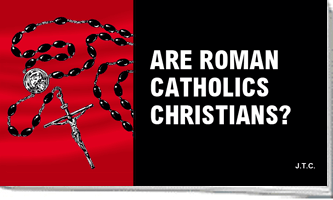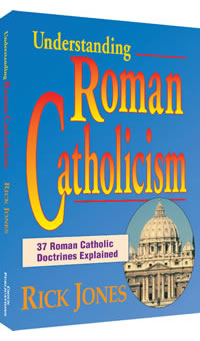Is "Evangelical" Catholicism Really Evangelical

A new book being reviewed by Christianity Today magazine is entitled, "Evangelical Catholicism: Deep Reform in the 21st-Century Church," by George Weigel. The book is reviewed by Brantly Millegan who claims to have been raised in an "evangelical, Protestant home," and "joined the Catholic Church during his senior year at Wheaton College."
According to Millegan, "Weigel argues the Catholic Church, since the 19th century, has been reorienting herself ever so slowly from 'Counter- Reformation Catholicism' toward a confident, outward-looking, gospel-proclaiming, mission driven faith. Which is to say, toward something distinctly evangelical." How sad that there is so much wrong with this picture. The central problem is the claim that Roman Catholicism is "gospel proclaiming." The Apostle Paul marvels that the Galatians have been "so soon removed... unto another gospel," (1:6).
Anyone who carefully compares the pope's "gospel" with Paul's gospel can only conclude that it is "another gospel;" one of a ritualistic working towards salvation and trust in the "church" instead of faith in Jesus, alone.
It is true that the Catholic Church has been "reorienting herself" since the 19th century and accelerated by Vatican II Council. However, as Weigel points out in his book, true Catholic reform comes, not from rejecting unbiblical tradition, but "from a rededication to the teachings of the Church and a reinvigoration of authentic Catholic practice." It appears from the content of this book and the context of its presentation, that American "evangelicals" have bought the lie that the leopard has changed its spots.
How is it possible that they have forgotten the history of the reformation where tens of millions died in the "counter reformation" as the pope defended his devilish teachings of a wafer god, Virgin Mary goddess, free passes out of purgatory, the pope as usurper of Christ's authority on earth through "apostolic succession, priests forbidden to marry, and salvation by works that could only be obtained through the blessing of the "church?" And this so-called "reorientation" did not involve any changes to their unbiblical "other gospel." So, what did they change?
Tactics.
The purpose of the counter reformation, (better known as the Inquisition), was to get back control of the true word of God, the Bible. During the dark ages, few could read and Rome kept the Bible in Latin. Ignorance and superstition reigned. When the Reformation leaders used the new Gutenberg printing press to get the Bible to the common man, Rome lost control.
Since this prostitute "church" always takes the long view they settled on two tactics. Instead of the poison of the stake and sword, they would use the honey of ecumenism. And instead of burning bibles, they would set out to pollute them. Chick Publications has covered extensively the success of the polluted Alexandrian, Westcott and Hort-based "modern" bibles. (See Daniels, Did the Catholic Church Give Us the Bible?, Look What's Missing, and Babylon Religion.)
This book by Weigel, promoted by Christianity Today, and lauded by a "Protestant evangelical turned Catholic," is supreme testimony to the success of ecumenism. The reviewer notes that "Ecumenically minded evangelicals should also be encouraged by the fact that the Second Vatican Council permanently committed the Catholic Church to the work of reestablishing full unity among all Christians." In 1983, Jack Chick warned in his book, Smokescreens, how Rome would only agree to "unity" if all the Protestant churches came back and accepted her false gospel. Smokescreens details how Protestant ministers like Billy Graham and Rex Humbard were the pope's pied pipers coaxing Bible believers back to Rome. Christianity Today's promotion of this deceitful book shamefully testifies to the success of Rome's new tactics.
- See more articles on related topics:
- Catholicism
- Ecumenism
Other Articles from March/April 2013:
- Adventures of Tim B.
- Up in Arms Over -Arm Evolution
- Department Of Justice: 'Home Schooling Not a Right in America'
- The Steepest Generation:1963-2013
- Are We The 'Barney Generation?'
- Some Need to be Shocked into the Kingdom
- Chick Tracts Reach Catholics in Goa, India
- Message From Jack Chick March/April 2013
- Chick Mail Bag March/April 2013
More on Catholicism:
Products of Interest:
-

Smokescreens
96 pages
Jack Chick shows that the ecumenical movement isn’t designed to bring all Christians into unity. That’s just a smokescreen, hiding the Vatican’s real intent, to stamp out religious freedom and rule the world. 
Are Roman Catholics Christians?
Show Catholics that neither their good works nor their religion can save them.-

Understanding Roman Catholicism
224 pages
37 Catholic doctrines from the current Catechism are compared with the Scriptures. They're not Christian! -

Did the Catholic Church Give Us the Bible?
208 pages
The Bible has two histories. One is of God preserving His words through His people. The other is of the devil using Roman Catholic "scholars" to pervert God’s words and give us corrupt modern Bibles.



